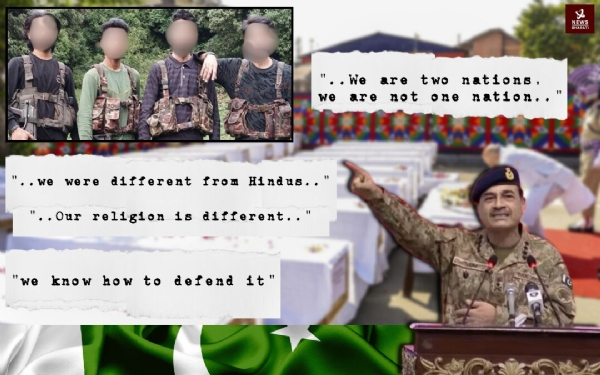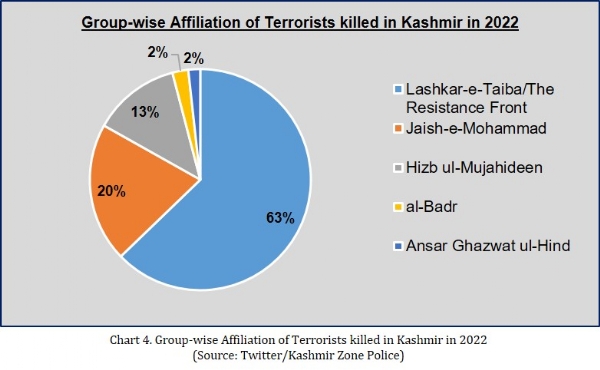Pahalgam Tragedy is the Price of Global Silence on Islamist Terror
The Pahalgam attack cannot be viewed in isolation. It is part of a broader pattern of radicalization driven by Pakistan’s deep state — a nexus of military, intelligence, and extremist ideologies.
Total Views |
The horrific tragedy that unfolded in Pahalgam on April 22 has left the nation reeling in grief and anger. Twenty-six innocent Hindus were brutally targeted and killed in a premeditated attack by terrorists affiliated with ‘The Resistance Force’ (TRF), a proxy outfit linked to Lashkar-e-Taiba (LeT). This devastating act of violence is more than just another incident in the history of militancy in Kashmir — it represents a profound call for the world to confront the inadequacy of its current understanding and definitions of 'terrorism'.

A Bloody Aftermath to Dangerous Rhetoric
The context of this attack is deeply alarming. Just six days before the massacre, the Pakistan Army Chief delivered a highly provocative speech in Islamabad to a conclave of Overseas Pakistanis. His address revived the divisive ideology of the two-nation theory, drawing sharp distinctions between Hindus and Muslims and glorifying martyrdom as an intergenerational duty. Far from a neutral or diplomatic statement, this speech injected a dangerous religious fervor into public discourse, possibly providing ideological ammunition for groups like TRF.
He proclaimed:
"We were different from Hindus in every possible aspect of life."
"We are two nations, we are not one."
"Don't forget to narrate this story to future generations."
This kind of rhetoric, coming from the top military authority in a nuclear-armed Islamic state, goes beyond political posturing — it becomes a dangerous narrative capable of inciting violence. The Pahalgam attack occurred within a week of this speech, and evidence suggests that at least two of the perpetrators were Pakistani nationals. The proximity in timing and ideology cannot be dismissed as coincidence.
TRF: A Rebranded Terror Machine
The Resistance Force is a relatively new name in the landscape of Kashmiri militancy, emerging after the abrogation of Article 370 and 35-A in 2019. It was initially projected as an indigenous, secular resistance movement — a strategic makeover by Pakistan’s Inter-Services Intelligence (ISI) to dodge global scrutiny. Unlike overtly religious groups like Lashkar-e-Taiba or Jaish-e-Mohammed, TRF uses a Western-style name and refrains from religious slogans in public communication.
Yet, its operations tell a different story. TRF has consistently targeted religious minorities, particularly Hindus and Sikhs, as seen in the 2021 killings of Supinder Kaur and Deepak Chand in Srinagar. Despite its rebranding, the outfit operates with the same ideology and brutality as its predecessors, revealing its true sectarian and terrorist nature.
TRF’s formation was part of Pakistan’s strategic attempt to legitimize proxy warfare in Kashmir. With growing international pressure, including its placement on the Financial Action Task Force (FATF) grey list, Pakistan needed a way to continue its operations under a softer guise. The TRF became the ideal proxy for Pakistan — sanitized in name, brutal in action.
Source: ORF
Religious Radicalization and the Role of the Deep State
The Pahalgam attack cannot be viewed in isolation. It is part of a broader pattern of radicalization driven by Pakistan’s deep state — a nexus of military, intelligence, and extremist ideologies. For over three decades, religious extremism has been systematically injected into Kashmir, distorting its ethos of "Kashmiriyat."
A 2020 paper titled "The Threat of Transnational Terrorist Groups in Kashmir" highlighted the attempts to derail India’s developmental efforts in the region. It noted that fears about demographic change, spread by Pakistan-backed propaganda, have been used to radicalize youth and undermine the government’s integration efforts.

Despite India’s ongoing initiatives to bring progress to Jammu and Kashmir — from job creation to infrastructure development — malign forces both across the border and within continue to spread fear, misinformation, and hate. This dual-front threat seeks to exploit religious sentiments and incite violence, as tragically manifested in the Pahalgam killings.
Global Definitions of Terrorism: A Gap in Understanding
Globally accepted definitions of terrorism, though broadly consistent, often fail to capture the nuances of ideologically and religiously motivated violence. For instance:
United Nations (UNSC 1566) defines terrorism as "criminal acts intended to provoke terror, intimidate populations, or coerce governments."
European Union (2002) includes "serious intimidation and destabilization of political and social structures."
United States (28 CFR §0.85) emphasizes the "unlawful use of force for political or social goals."
United Kingdom (Terrorism Act 2000) uniquely includes "religious motives explicitly."
NATO speaks to "coercion of societies through violence to achieve political or ideological ends."
These frameworks provide a foundational understanding of terrorism but fall short in addressing the practical reality: the recurring pattern of Islamic extremism in global terrorism. While it is critical to avoid generalizations and ensure that definitions do not stigmatize any faith, ignoring the religious dimension — especially when explicitly invoked by perpetrators — renders counter-terrorism strategies ineffective.
The Pahalgam attack clearly involved religious targeting. The fact that the attackers singled out Hindus, following ideological cues from a religiously charged military speech, underlines this point. This dimension must be acknowledged in any honest and effective definition of terrorism.
The Urgent Need for a Practical Redefinition
The world stands at a critical juncture. With rising acts of terror rooted in religious extremism, the failure to update global frameworks risks enabling further violence. If international institutions are to remain relevant and effective in combating terrorism, they must recognize that ideology — particularly religious ideology — is a significant driver.
India, in particular, must lead this charge. As a nation that has borne the brunt of Islamist terrorism for decades, from the 2008 Mumbai attacks to the 2022 Pahalgam tragedy, India has the moral and strategic imperative to call for a realistic, unambiguous, and actionable definition of terrorism.
This means:
- Recognizing the ideological motives behind terrorist acts.
- Demanding accountability from nations that propagate or shelter such ideologies.
- Updating counter-terrorism strategies to account for ideological indoctrination.
The Lesson from Pahalgam
The bloodshed in Pahalgam is not just a grim reminder of the threat of terrorism — it is a wake-up call for the global community. We can no longer afford to tiptoe around sensitive truths. If terrorism is to be eradicated, it must first be understood in its full context — including the role of religion when explicitly invoked to justify violence.
The world needs a practical, inclusive, and unflinching definition of terrorism. This is the clearest, most pressing lesson from Pahalgam. The time to redefine terrorism is now — before more innocent lives are lost to ideological hatred masquerading as resistance.
The article is based on research provided by Vayuveg
--



